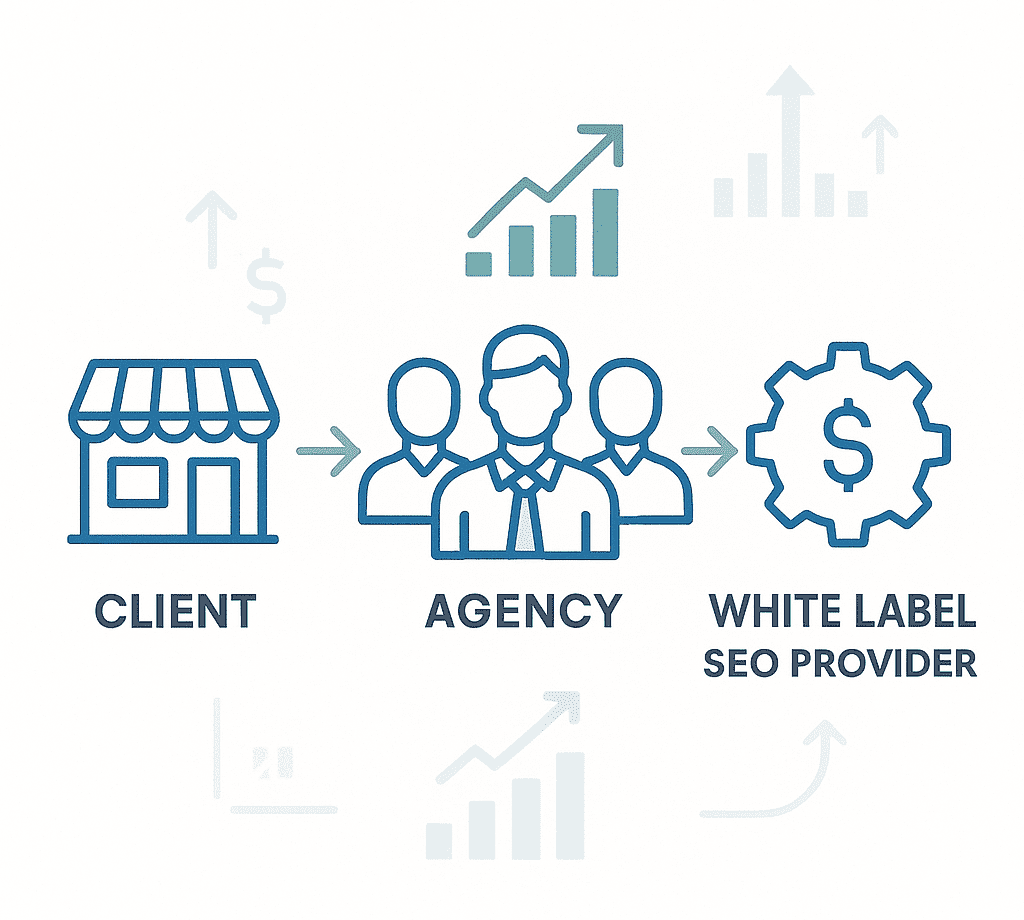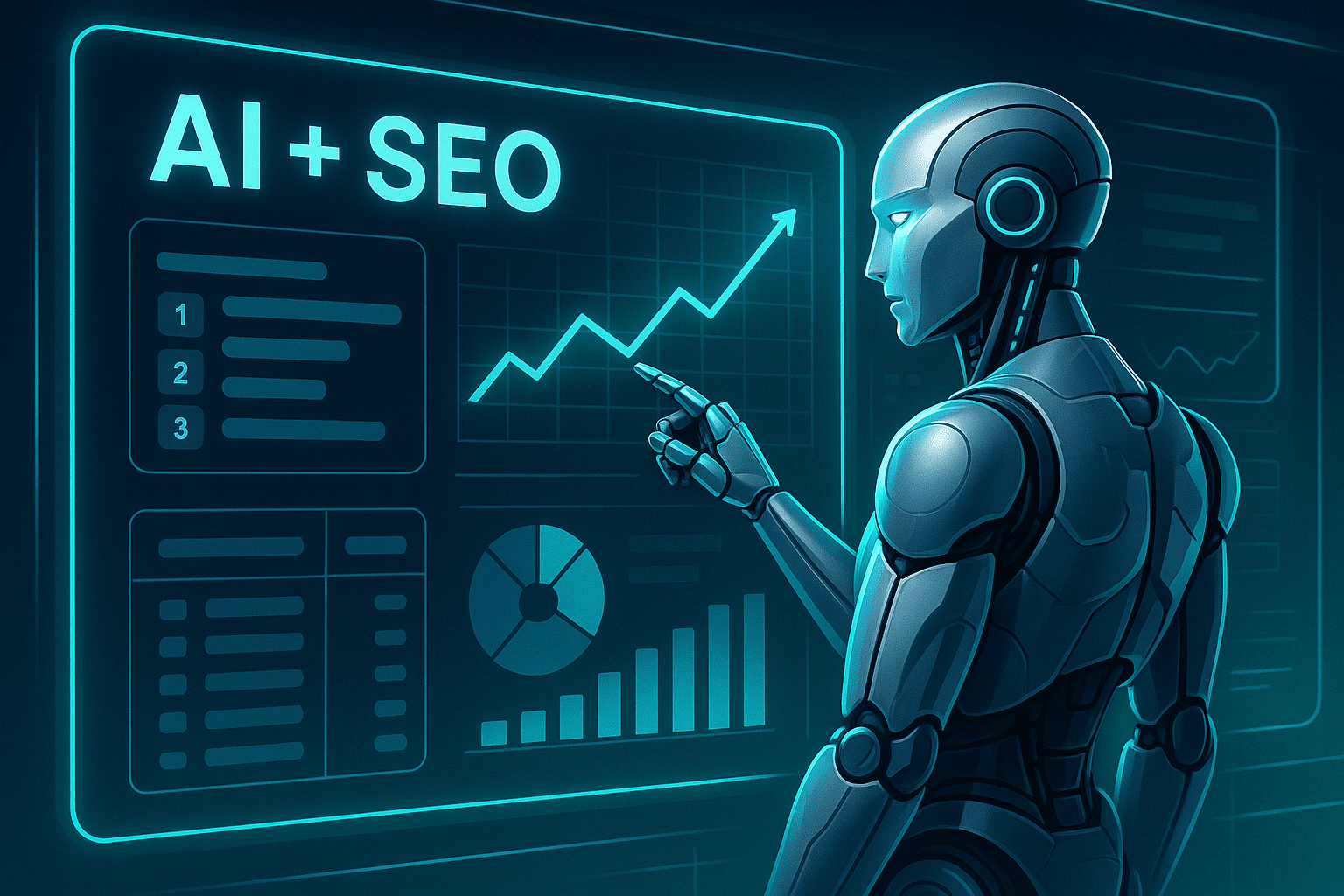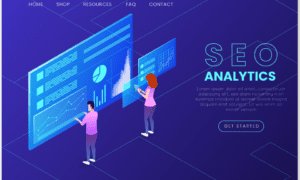The future of white label SEO isn’t just about saving agencies time anymore.
In 2025, it’s about survival.
AI in SEO 2025 has changed the game: keyword research, reporting, and even content creation now move faster than most teams can type an email.
With AI Overviews now reaching over a billion users every month (Exploding Topics), search engines expect content that’s optimized for this new landscape.
Agencies that still juggle in-house hiring or old-school outsourcing are bleeding margin while competitors scale with SEO automation and smarter systems.
Here’s the problem: small and mid-sized agencies want to grow, but staffing every role eats profits. Clients expect enterprise-level reporting, faster deliverables, and visible results, without enterprise pricing.
It’s like trying to win a Formula 1 race while driving a lawn mower.
The good news?
White label SEO backed by AI and automation levels the track. Done right, it becomes a profitability engine: agencies can expand services, deliver consistent results, and keep their name on the front of the report. That’s why we put this guide together, to give agencies a clear plan for thriving instead of playing catch-up.
Why White Label SEO Matters More Than Ever in 2025
White label SEO used to be a backup plan.
Agencies leaned on it when bandwidth got tight. But in 2025, it’s the backbone of growth. Nearly all small businesses now see tech as essential for expanding and 43% point to AI as the most helpful tool for global reach, however, 44% still hesitate due to high costs and uncertain ROI (TechRadar).
Big brands dominate search and marketing budgets. For an independent agency, going head-to-head without smart partners is like showing up with a butter knife in a sword fight.
Here’s the agitation: clients don’t care how many hours you worked or how many hats your team wears.
They care about results.
If you can’t show rankings moving, leads flowing, and reports improving, they’ll move on to the next agency that can.
That’s where white label SEO services step in. Instead of overloading your internal staff or scrambling for freelancers, agencies can scale instantly with ready-made systems.
You get keyword research, optimized content, technical fixes, and link strategies, all under your brand. Your client sees consistency, you see profitability.
At Logic Inbound, we’ve seen this firsthand. Many of our partners use white label SEO not just to survive, but to expand service offerings they couldn’t manage alone. Pairing services like small business SEO or local SEO with white label support gives agencies a competitive edge they simply couldn’t afford otherwise.

The Role of AI in White Label SEO
AI isn’t replacing SEO in 2025, it’s redefining how agencies deliver it. White label providers that bake AI into their systems now offer speed, precision, and insights that were unthinkable just a few years ago.
For agencies, this means faster turnarounds, stronger reporting, and more margin left on the table. Let’s break it down.
Smarter Keyword & Topic Research
Finding the right keywords used to take hours of manual digging. Now, AI tools map topical clusters in minutes. Instead of chasing individual phrases, you get a content roadmap built around user intent. That means SMBs can claim authority in niche areas where big brands usually dominate, without hiring an army.
Agencies tapping into AI-driven keyword research inside white label SEO services gain scale. You’re not guessing, you’re working with models that detect 45% more high-impact keywords than traditional tools. That’s not theory, that’s the real advantage.
Content Velocity at Scale
AI makes it possible to create high-quality content outlines, drafts, and FAQ sets faster than ever. But speed alone isn’t the goal. Agencies that win pair automation with human editing, ensuring every piece reads like a person wrote it. White label SEO teams that understand this balance can deliver four to five optimized pages per week, without bloating payroll.
For small businesses, this pace is what allows them to compete with enterprises publishing daily. Agencies can now offer volume without sacrificing quality, and that directly translates to client satisfaction and retention.
Real-Time Reporting & Analytics
Clients don’t want static monthly PDFs anymore. They want live dashboards that show progress in real time. AI-driven SEO reporting delivers exactly that, tracking keyword positions, flagging anomalies, and even predicting ROI. For agencies, this turns reporting into a retention tool instead of a time sink.
With automated dashboards, your client gets transparency, and you get fewer late-night “what’s happening with my site?” calls. White label providers that integrate AI reporting make it easier for agencies to focus on strategy, not spreadsheets.
Automation Beyond AI – Systems That Boost Profitability
AI gets the headlines, but automation is the quiet engine that keeps agencies profitable. White label SEO providers that build smart systems save agencies from drowning in admin work and free up time for strategy. Let’s look at the two biggest areas where automation makes or breaks margins.
Workflow Automation for Agencies
Onboarding, approvals, content scheduling, these tasks eat hours if you manage them manually. In 2025, top white label SEO partners automate the boring stuff. CRMs link directly with project management tools, client emails trigger task creation, and reporting flows without a human babysitter.
For agencies, this is where the real profit shows up. Less time wasted means higher margins on every account. It’s not glamorous, but it’s the difference between growth and burnout.
Automated Link-Building & Digital PR
Link-building is still one of the most labor-intensive parts of SEO. That’s why automation here is a game-changer. AI tools now scan journalist requests, draft personalized outreach, and suggest partnerships. Agencies using white label link-building services get quality at scale without burning out their team.
The catch? Automation should never mean spam. Google still punishes shortcuts. The winning strategy in 2025 is AI-assisted outreach that feels human like finding the right local blog or niche site, then pitching a story that actually fits.
To keep it clear, here’s a simple breakdown:
| Approach | Manual Link Building | AI-Assisted Link Building |
| Speed | Slow (5-10 links/month) | Fast (20+ targeted links/month) |
| Personalization | High but limited | High with automation filters |
| Risk of Spam | Low if careful | Low if QA is built in |
| Cost to Agency | High (staff hours) | Lower (scalable systems) |
White Label SEO vs Traditional Outsourcing: What’s Changing
Outsourcing SEO isn’t new.
Agencies have been sending tasks to freelancers or offshore teams for decades. But in 2025, that model shows its cracks: inconsistent quality, lack of reporting, and little accountability. White label SEO changes the equation. It gives agencies the same flexibility of outsourcing but with systems, SLAs, and branded reporting built in.
For clients, the difference is invisible, they only see your brand on every deliverable. For agencies, the difference is survival. You’re not chasing freelancers for updates or worrying about who’s on vacation.
You get a partner with a process.
Here’s how the models stack up:
| Feature/Model | White Label SEO | Traditional Outsourcing | In-House Team |
| Branding | Under your agency’s name | Third-party visible | Fully in-house |
| Reporting | Branded dashboards, automated | Often limited/manual | Custom but time-intensive |
| Quality Control | SLA-driven, standardized | Varies by freelancer | High but resource-heavy |
| Scalability | High (add accounts instantly) | Moderate | Low (hiring bottleneck) |
| Cost Efficiency | Lower overhead, higher margins | Cheaper upfront, risky | Most expensive |
| Client Retention | Strong (consistent delivery) | Weak (quality swings) | Strong but costly |
The big change? White label SEO now combines automation, AI, and transparency, something outsourcing alone can’t match. And unlike building in-house, you don’t carry the payroll risk.
A recent guide on scaling with a white label partnership noted that “traditional outsourcing provides flexibility and oversight, while a white label partnership enables rapid expansion without increasing internal cost.” That sums up why smart agencies are shifting toward white label SEO in 2025 (Pennine Tech Labs).
Profitability Playbook for Agencies Using White Label SEO
Profitability isn’t just about cutting costs. It’s about turning SEO into a repeatable revenue engine. White label SEO gives agencies that engine, especially when paired with automation and AI.
Here’s the problem: agencies often win new clients but struggle to scale delivery without crushing margins.
Hiring full-time staff for every role, writers, SEOs, link-builders, means your payroll balloons before your client list does.
Outsourcing to random freelancers?
That saves money at first but creates churn when quality slips.
With white label SEO, agencies keep the revenue while the heavy lifting is done behind the scenes. A $1,500 per month package from a provider can be resold for $3,000 under your brand, leaving room for healthy profit and client management.
Multiply that margin across 10-20 clients, and you’re looking at recurring revenue that grows without bloating your overhead.
Agencies also see:
- Lower churn rates thanks to consistent reporting and results.
- Higher LTV (lifetime value) because clients stay longer.
- Predictable cash flow with monthly packages.
This is where Logic Inbound’s case studies shine. For example, in our Junk Removal SEO case study, scaling content and backlinks through a systemized process drove traffic up by 1,140%. Results like that make the profitability argument real, not just theory.
How Agencies Can Choose the Right White Label SEO Partner in 2025
Not all white label SEO providers are created equal. In 2025, the best partners combine AI, automation, and proven systems but they also back it up with transparency. Choosing the wrong partner means risking your reputation.
Choosing the right one sets you up for long-term profitability.
Here’s a quick checklist agencies can use before signing any deal:
- SLA and guarantees: Do they outline deliverables and timelines clearly?
- AI and automation stack: Are they using modern tools for keyword research, content scaling, and reporting?
- Reporting quality: Do they provide branded dashboards and real-time updates instead of static PDFs?
- Industry experience: Can they show wins in niches like healthcare, e-commerce, or local services?
- Transparency: Do they share their process openly, or hide behind vague promises?
- Scalability: Can they handle 5 clients as easily as 50 without dropping quality?
For agencies, this isn’t just about finding a vendor, it’s about protecting your brand. Your clients see their name on the report, not the partner’s. So if the partner cuts corners, it’s your reputation on the line.
That’s why reviews and proof matter.
FAQs on the Future of White Label SEO
1. What is white label SEO in 2025?
White label SEO in 2025 is when an agency delivers SEO services under its brand while another provider does the execution. The difference today is the heavy use of AI and automation. Agencies get faster keyword research, scalable content, and branded reporting without adding overhead.
2. How does AI improve white label SEO services?
AI takes tasks that once took hours like keyword clustering, content outlines, and rank tracking and finishes them in minutes. This lets agencies focus on strategy while the provider handles execution at scale. The result is more campaigns, less cost, and better margins.
3. Is AI-generated SEO content safe for Google rankings?
Yes, as long as it’s reviewed and edited. Google rewards content that’s helpful, accurate, and people-first. AI tools can speed up drafts, but a human editor should polish tone, structure, and expertise before it goes live. Think of AI as an assistant, not a replacement.
4. How profitable is white label SEO for agencies?
Many agencies double their margins by reselling white label SEO packages. For example, a $1,500 monthly package can be resold at $3,000 or more, while the provider does the heavy lifting. The scalability also lowers churn since clients see consistent delivery.
5. What’s the difference between white label SEO and outsourcing?
Outsourcing usually means hiring freelancers or contractors. Quality and reporting vary, and your brand isn’t front and center. White label SEO, by contrast, includes standardized processes, branded reporting, and scalability, making it safer for agencies that need consistency.
Final Thoughts: The Future-Proof Agency Model
The future of white label SEO is clear. Agencies that embrace AI, automation, and proven partners will scale profitably.
Those that don’t will keep juggling staff headaches, rising costs, and restless clients. By combining smart systems with white label support, agencies can deliver enterprise-level SEO without enterprise overhead. It’s the difference between fighting to stay afloat and building a business that grows on autopilot.





























